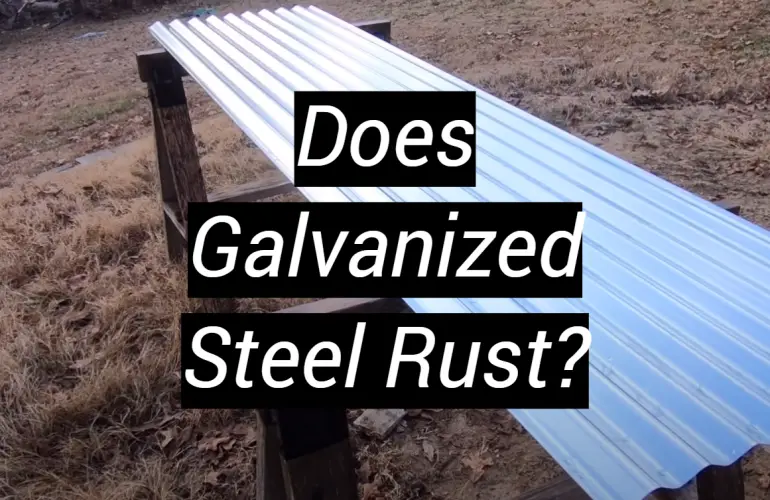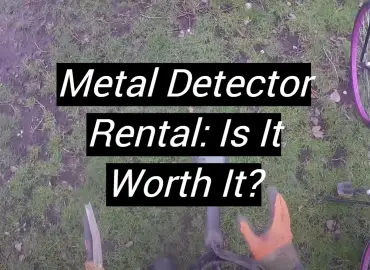Does Galvanized Steel Rust?
The primary concern with galvanized steel is whether or not it will oxidize, leading to potential rusting. Galvanized steel is an ideal option for outdoor use due to its remarkable capability of withstanding corrosion. However, some people still wonder if it can really stand up to the elements. Uncovering the science of galvanized steel and its capabilities to resist rusting, let’s dive into a closer examination.
What Is Galvanized Rust?
Galvanized rust is an insidious form of corrosion that forms when galvanized steel, exposed to oxygen and moisture in the environment, begins to corrode.
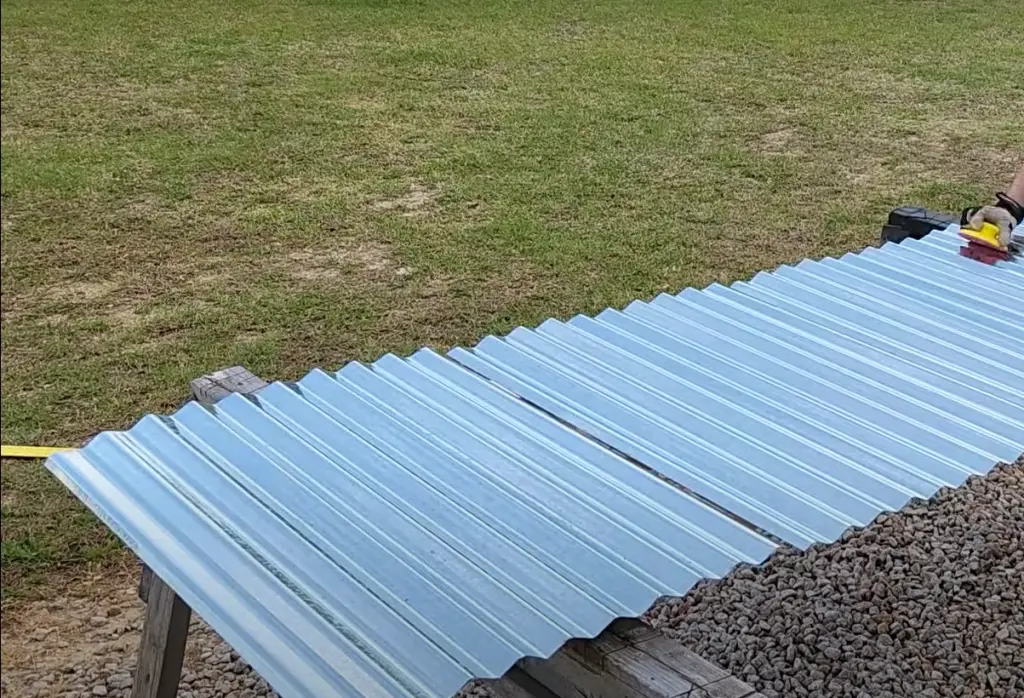
The coating that is applied to the steel during the galvanization process creates a barrier between the steel and its environment. This barrier helps protect against rust. Nevertheless, when the protective coating suffers wear and tear or is compromised in any way, this may permit moisture and oxygen to interact with the underlying steel which could result in galvanized rust. [1]
How Does Galvanizing Prevent Rust?
Protect your steel from corrosion with galvanizing, a process that coats the metal in zinc. This layer acts as a shield for the steel, guarding it against corrosion, rusting and other forms of damage. The zinc acts as a shield against any corrosive elements, shielding the underlying steel from reacting with oxygen to form iron oxide (rust).
Therefore, it’s an optimal choice when you need a resilient material that will stay strong and undamaged over time.The longevity of the galvanized coating is contingent on its thickness, as this will determine how much time passes before rust begins to spread across your metal’s surface. Thicker layers are more resistant to corrosion and can provide better protection in harsh environments.
Galvanizing also provides an additional layer between steel and its environment, further protecting it from moisture and humidity. This helps to prevent the formation of rust, as well as other forms of corrosion. It also increases the lifespan of steel by providing a barrier that prevents water, dirt, and other corrosive materials from reaching the metal’s surface.
Galvanized steel is an excellent choice for applications where durability and protection are necessary. It can be used in many different industries, including construction, automotive manufacturing, energy production, and more.
Galvanized steel is a durable material that can last for decades with appropriate care and servicing, remaining free from rust or damage. By choosing this type of steel over other types available on the market today, you can ensure that your project will stand up to the elements for years to come! [2]
Factors that Affect Galvanized Steel’s Susceptibility to Rust
Galvanized steel is known for its ability to stave off rusting, however it may still succumb to corrosion gradually. The amount of its corrosion-proofing relies on many elements, like the kind of galvanization process used, what environment it is exposed to and how quickly moisture builds up.
The type of galvanization greatly affects its corrosion-resistance capabilities. Hot-dip galvanizing coats a thin layer of zinc onto steel surfaces, while electroplating involves coating a thicker layer of zinc or other metals onto the surface. Hot-dip galvanizing provides more protection from corrosion than electroplating due to its thicker coating and longer lifespan.
The environment in which galvanized steel is exposed to can also influence how much it rusts. If the environment is humid or contains a lot of moisture, the steel will be more prone to corrosion due to the increased rate at which moisture accumulates on its surface. Additionally, areas with high levels of salt and acidity can corrode galvanized steel more quickly since these substances accelerate the oxidation process. [3]
Impact of Local Environmental Conditions
Galvanized steel is highly resistant to corrosion, but it is not completely immune. In certain conditions, galvanized steel can rust sooner than expected. The most important factor in determining the longevity of galvanized steel is the local environmental conditions where it is used. Factors such as humidity, temperature and pollution levels all play a role in how quickly galvanized steel may start to rust.
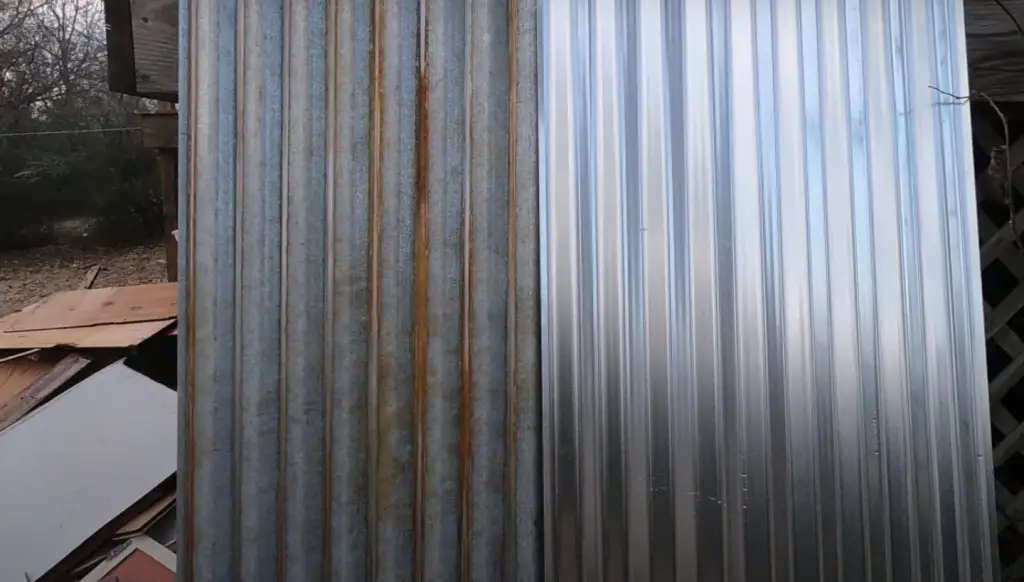
For example, if the area has high levels of acid rain or salty sea air, this will contribute to accelerated corrosion of the metal coating on the surface of the steel, making it more likely to rust sooner than other environments with milder climates and less airborne pollutants.
Additionally, if you are using galvanized steel for outdoor applications that require frequent contact with water (such as fencing), the steel could be more prone to rusting due to oxidation from frequent contact with moisture. This is why it’s important to regularly inspect galvanized steel for signs of corrosion, and take action to prevent further damage if necessary.
The good news is that proper maintenance and regular inspection should help extend the life of your galvanized steel so you can enjoy its benefits for many years. If you have any questions or concerns about how your environment might affect the longevity of your galvanized steel, don’t hesitate to consult an experienced professional who can offer advice on how best to protect it.[3]
How Long Do You Need it to Last?
Galvanized steel is an amazing material due to its ability to resist corrosion and rust. This makes it ideal for use in many applications where durability and longevity are important. However, just like any other material, galvanized steel will eventually succumb to rusting if exposed to the elements over a long period of time. The key question then becomes, how long do you need your galvanized steel to last?
The answer depends largely on the environment that it is placed in, as well as the type of galvanizing applied during manufacturing. The two most common types are hot-dip galvanizing and electroplating. Hot-dip galvanizing creates longer lasting coatings than electroplating but may require more maintenance depending on the environment it’s placed in.
Under these conditions the zinc coating will break down faster than normal and result in rusting of the steel. For this reason, if your application is going to be exposed to any of these elements you should consider a more durable alternative such as stainless steel or aluminum.If you plan on using galvanized steel under normal environmental conditions then you can expect it to last for many years without much maintenance or upkeep. However, regular inspections should still be done to ensure that there is no rust forming on the surface of the metal.
What Are The Best Storage Conditions For Galvanized Steel?
Galvanized steel is a great choice for durability and longevity. However, it does require proper storage conditions to maintain its rust-resistant properties. Ideally, galvanized steel should be stored indoors in a dry environment with low humidity levels. If this is not possible, then the surface of the steel should be covered or sealed from exposure to moisture, dust, and dirt.
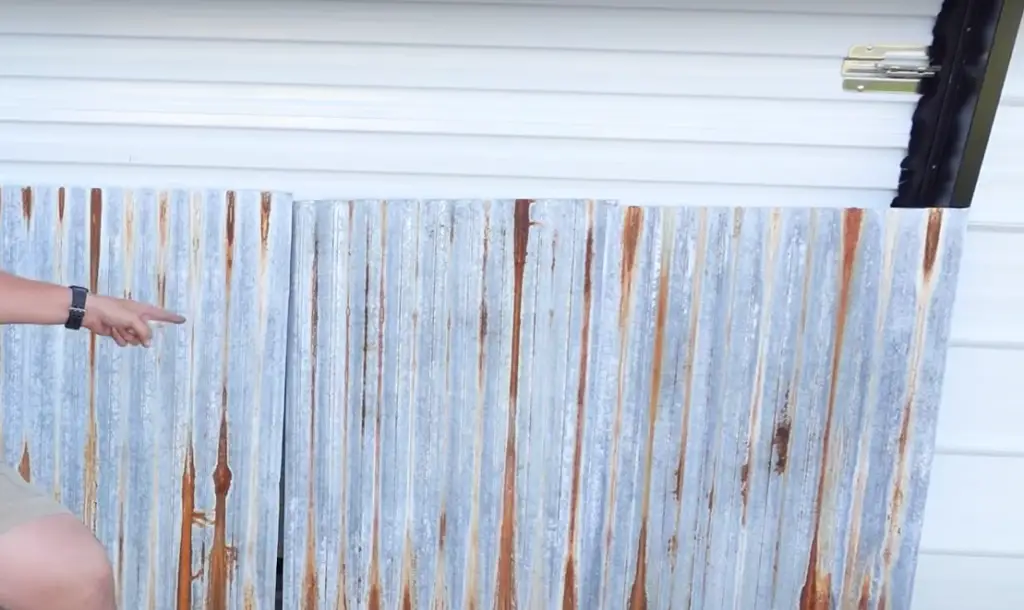
In addition, galvanized steel should never be left outdoors for extended periods of time as UV light can cause its protective zinc coating to deteriorate over time. Periodic maintenance such as cleaning the surface and applying a fresh coat of oil can also help keep galvanized steel in top condition by preventing rust formation due to moisture infiltration or trapped debris.
Ultimately, taking care of your galvanized steel by maintaining appropriate storage conditions can help to extend its lifespan and keep it looking good for years to come. [4]
Pros and Cons of Galvanized Steel
Galvanized steel is a popular construction material due to its durability and low-maintenance requirements. It is often used in structural components, fencing, and even roofs due to its strength and corrosion resistance. While galvanized steel does not rust as quickly as other metals, it still has some major disadvantages that should be considered before using this material for your project.
Pros:
- High Corrosion Resistance – Galvanized steel offers superior corrosion resistance due to the zinc coating applied during manufacturing. This can help ensure that your structure or component will last longer than if you were to use unprotected materials.
- Low Maintenance – As galvanized steel has high corrosion resistance, it requires less maintenance than other metals. This makes it ideal for outdoor structures that may not be regularly monitored.
- Durable – Galvanized steel is very strong and can withstand harsh weather conditions without deteriorating.
Cons:
- Cost – Galvanized steel is typically more expensive than other metals due to the additional zinc coating required during manufacturing.
- Fragile – Although galvanized steel is strong, it is still susceptible to bending or cracking if too much force is applied. This means that careful handling and installation are necessary in order to maintain its integrity over time.
- Rusting Over Time – While galvanized steel does not rust as quickly as other metals, it will gradually start to show signs of corrosion after several years. Regular maintenance and cleaning can help to extend its lifespan.
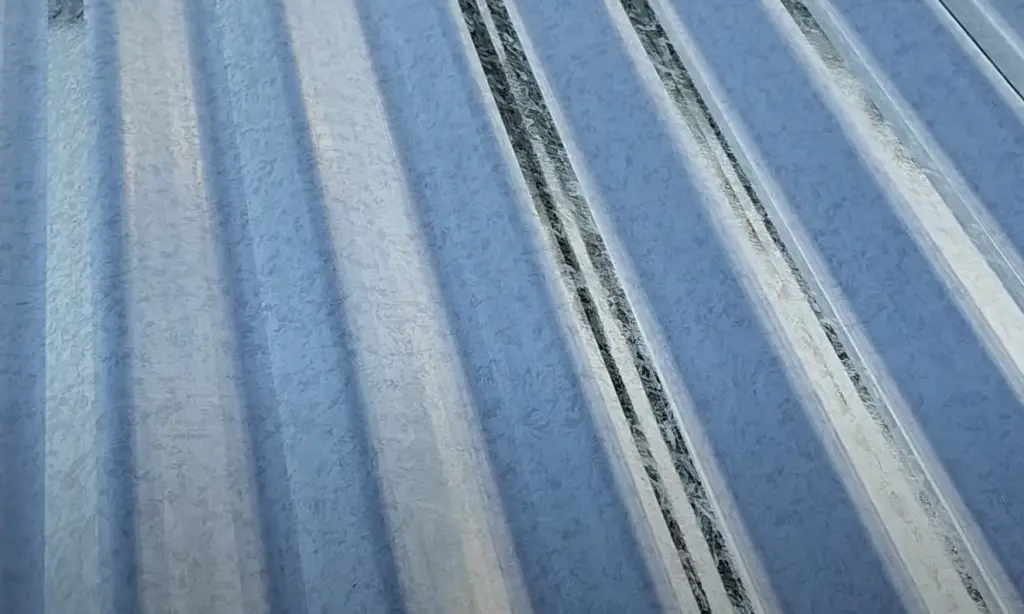
Overall, galvanized steel is an excellent choice for construction or structural components due to its strength, durability, and corrosion resistance. However, it is important to understand both the pros and cons of using this material in order to make the best decision for your project. Taking into account all factors can ensure that you get the most out of your investment while keeping your structure safe and sound. [5]
FAQ
How long will galvanized steel last before it rusts?
Galvanized steel has a protective layer of zinc-oxide that prevents rust from forming. Depending on the environmental conditions, galvanized steel can last up to 50 years before rusting begins to occur. The thickness and quality of the coating also influences how long it will take for the steel to begin to rust. If the coating is compromised, for example due to scratches or other damage, then rust may form sooner than expected.
Are there any special precautions I should take when handling galvanized steel?
Yes! Galvanized steel is coated with an oil-based substance and you should wear gloves while handling it in order to avoid skin irritation or corrosion. Additionally, because galvanized steel is more prone to corrosion due to the zinc coating, it is important to avoid contact with alkaline or chlorine-based cleaning products. These may damage the protective layer and cause rusting.
What types of environments are most likely to cause galvanized steel to rust?
High humidity, salt water, acidic rain, and corrosive gasses can all speed up the rate at which galvanized steel will rust. Additionally, any metal that has been scratched or damaged in some way will be more susceptible to corrosion.
Can I paint over galvanized steel?
Yes! Painting over galvanized steel can help protect it from corrosion and rusting. However, it is important to make sure the surface is properly prepared before applying any paint. This may include cleaning, priming and sanding in order to ensure that the paint will adhere correctly and provide optimal protection.
Is galvanized steel waterproof?
No. Galvanized steel has a coating of zinc-oxide which helps protect against corrosion, but it is not waterproof. Therefore, if galvanized steel will be exposed to water or moisture it should be treated with a sealer or other protective coating in order to ensure maximum protection against rust and corrosion over time.
What are the disadvantages of galvanized steel?
Galvanized steel can still be vulnerable to rust and corrosion. Over time, the zinc coating may start to wear away, which will allow moisture and oxygen to come in contact with the underlying steel and cause it to corrode. When galvanized steel is exposed to corrosive environments or extreme temperatures, its protective layer can become compromised more quickly. Galvanized steel tends to be more expensive than other forms of steel due to the additional processing and materials involved in coating it with zinc. Its heavier weight also makes it difficult or costly to transport or install when compared with non-galvanized varieties. Additionally, welding galvanized steel produces hazardous fumes that must be dealt with properly for safety reasons. Finally, galvanizing prevents the painting of a surface, which can be a disadvantage in certain applications. For these reasons, galvanized steel may not be the best choice for every application.
Useful Video: Rusting Corrugated Metal Fast
Conclusion
In conclusion, galvanized steel is a great choice for applications that require both strength and corrosion resistance. Generally, it will not rust in the short term, as long as it is regularly maintained and kept clean of dirt and debris. However, over time it can develop rust spots due to exposure to moisture or chemicals. If this happens, you may need to take steps to repair the damage or replace the material with regular steel or another more corrosion-resistant product. Ultimately, the decision about which type of metal is best for your application should be based on your budget and specific needs. With the right care and maintenance, galvanized steel can provide a durable and economical solution.
References:
- https://southatlanticllc.com/blog/does-galvanized-steel-rust/
- https://monnigindustry.com/2020/04/02/does-galvanized-steel-rust/
- https://www.bucket-outlet.com/Does-Galvanized-Steel-Rust.htm
- https://www.industrialmetalsupply.com/blog/4-types-of-metal-that-are-corrosion-resistant-or-dont-rust
- http://locker.com.au/blog/architecture/galvanised-vs-stainless-steel-which-should-you-choose/

